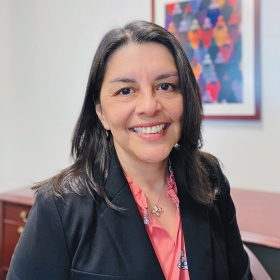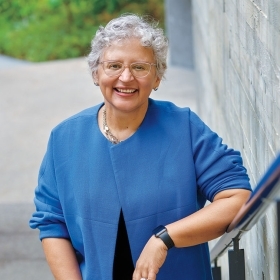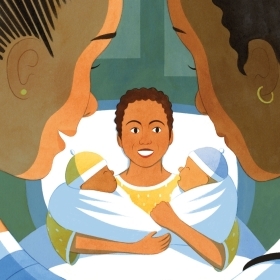Amy Aparicio Clark ’92
Amy Aparicio Clark ’92 is lead director in CVS Health’s philanthropy division, where she has developed grants portfolios addressing disparities in maternal health outcomes between white and Black women, and youth experiencing mental health challenges.

A dual American and Peruvian citizen, Amy Aparicio Clark ’92, lead director in CVS Health’s philanthropy division, hails from an immigrant family that highly values education. At Wellesley, she took full advantage of the liberal arts offerings, majoring in political science and learning Russian, too.
She lined up a volunteer position at a rural Russian orphanage post-graduation. But as she sat before commencement speaker Hillary Rodham Clinton ’69, Amy wasn’t sure about her future. She was drawn to Secretary Clinton’s saying that there are many ways to help children, that people don’t need to choose between caring for themselves and their families and the larger family of humanity. “It was liberating to hear,” Amy says. She trusted her time in Russia would elucidate next steps.
It did. She was inspired to earn a master’s in education back in the U.S., then teach dual language learners in Spanish. “That cemented my commitment to young people and education,” Amy says. She moved on to roles in education nonprofits. One project entailed co-authoring a Connecticut plan to help increase Black and Latinx students’ access to excellent educators. That led to a grant program helping Connecticut school districts create programs to attract and retain teachers of color.
Amy often worked with foundation directors. “They had such interesting roles,” she says. “I started to get curious.” When a position opened up with the Aetna Foundation in 2016, Amy jumped at the chance to help gather and synthesize data about the impact its grants had on communities. “Since then, I’ve gone deeper and deeper into strategic grantmaking.”
At CVS Health, Amy helps decide how its foundation gives grants. She has developed grants portfolios addressing disparities in maternal health outcomes between white and Black women, and youth experiencing mental health challenges.
During a chance meeting at a work-related event with Clinton’s chief of staff, Amy mentioned how the Secretary’s speech had affected her. Weeks later, she received a letter on Clinton’s personal stationery. Clinton was pleased her words helped steer Amy to a life in service.
The letter now hangs above her desk. “It was such a Wellesley moment, and reinforced how the community is lifelong,” Amy says.

